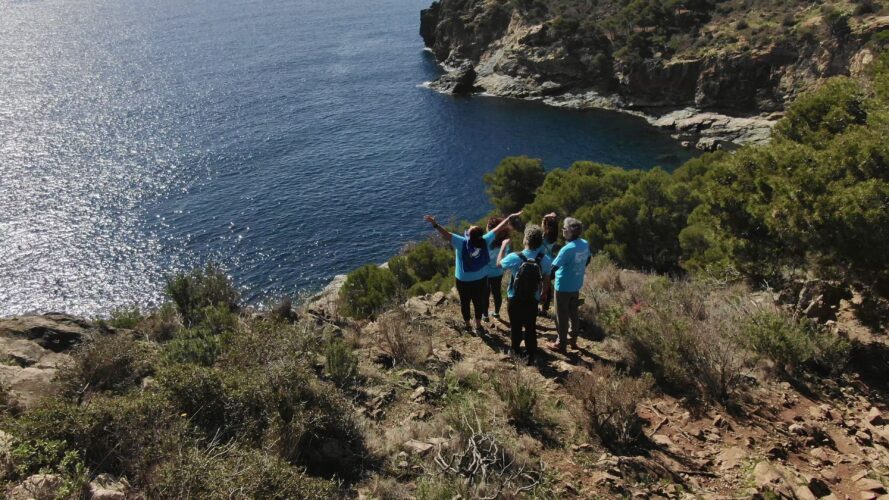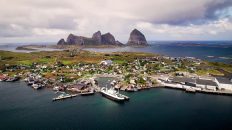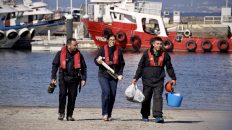In the stunning Cap de Creus natural park in northeastern Catalonia, a group of hikers is participating in a unique study that explores the healing power of the coastal environment.
“Six years ago I had breast cancer. I had to undergo treatment, radiation therapy, take medications, and all this was a heavy blow… But now every day I enjoy this environment that helps me feel better,” said oncology patient, Marissa Busquets.
“The soothing sound of the sea, the smell of pine trees give inner peace, which is the best pill for our inner health. And inner health helps outer health, too,” she explained.
It’s widely believed that the ocean has plenty of health benefits, but researchers admit there is a lack of concrete data. So a team of doctors and researchers from the city of Roses, in northeastern Spain, invited 24 oncological patients to take part in coastal activities over two years and closely monitored the effects.
“We were surprised that with a small number of patients, we saw a significant effect,” revealed Dr Àngel Izquierdo-Font, an oncologist at the Catalan Institute of Oncology.
“These patients completed treatment some time ago and do not have active cancer. But some of them suffer from chronic symptoms or some kind of emotional disorder, and we think that this activity in contact with nature can be of great practical benefit to them,” he added.
Although these activities cannot replace medical therapy, they were shown to have measurable positive effects on the emotional well-being of patients. The researchers collected data through questionnaires and monitored key health indicators with smartwatches.
“Every time we start any activity, whether it’s a walk by the sea or swimming, snorkelling or something else, we control the heart rate and oxygen saturation of the body…” said study participant and oncology patient, Eliana Guerrero.
“It’s something that gives you a lot of endorphins, a lot of energy. The sea is a small pharmacy that you need to know how to use,” explained fellow participant, Maria Palou.
Therefore, researchers suggest integrating “blue spaces” into social prescribing programmes that connect primary care patients to community services and resources: family doctors can prescribe activities such as bathing or snorkelling to their patients, as part of their treatment plan.
“When solving health problems that do not require treatment, we sometimes find social activities in the fresh air, in nature, at sea, much more beneficial than medicines,” Dr Eva Fontdecaba, a family doctor at the Catalan Health Institute told Euronews.
This collaboration between scientists, doctors, a cancer foundation, and local authorities contributes to a growing area of research exploring the many ways in which the sea impacts our health and well-being, from the food we eat to the air we breathe.
But these benefits rely on the health of the sea itself. If the natural habitats and ecosystems are not preserved, the benefits to human health could be lost.
Dr Josep Lloret, a marine biologist at the University of Girona, coordinates this research in Roses.
“This line of research, Oceans and Human Health, explores all these benefits, but at the same time examines how the risks and threats that we humans expose to the sea, end up being detrimental to human health through increased pollution, more pathogens or more industrialisation,” he explained.
Catching more than just waves: surfers at higher risk
The pollution in coastal waters can sometimes turn the sea’s health benefits into hazards.
Cornwall, a popular surfing destination in southwestern England, is no exception. Surfers visiting these idyllic beaches have to keep an eye on water quality alerts because, in many locations around the country, water treatment facilities can exceed their capacity and discharge harmful raw sewage, making coastal waters unsafe for activities like surfing.
“It’s really important for my mental health, and for lots of people who live down here in Cornwall, it’s a really important part of our lives,” explained Izzy Ross, the Campaigns manager at the marine conservation charity, Surfers Against Sewage.
“But unfortunately sometimes we can’t get in the water because it’s not safe to do so.”
Izzy says that surfers are particularly vulnerable to the harmful effects of pollution, as they are constantly exposed to the water when rolling under the waves.
“Sometimes you swallow some of that water — it means that you are ingesting quite a lot of potentially harmful bacteria and viruses. Last year we had 720 reports, and some of those were really quite shocking — we had things like gastroenteritis, we had eye infections, ear infections, urinary tract infections, and even a case of kidney failure.”
To better understand the risks, surfers worked with researchers from the European Centre for Environment and Human Health at the University of Exeter Medical School. An EU-funded project analysed samples taken from surfers across the UK, and the findings were alarming.
“We found that surfers are about three times as likely compared to people who don’t go in the water to carry antibiotic-resistant bacteria in their faecal microbiome sample. And this is really important because there’s potential for people to spread antibiotic-resistant bacteria to other people,” said Dr Anne Leonard, an environmental epidemiologist with the European Centre for Environment and Human Health at the University of Exeter Medical School.
Researchers found that streams carrying urban and agricultural waste into our seas are fuelling the evolution of drug-resistant pathogens. Such infections are already taking a heavy toll, rivalling that of the COVID-19 pandemic. By 2050, they may become the leading cause of death worldwide.
“Human and animal waste also includes antibiotic residues. And even though those are really dilute and low levels in water like river water and seawater, we are finding now that actually, it can still be at a level that can drive further antibiotic resistance,” said microbiologist Dr William Gaze.
The laboratory experiments at the University of Exeter confirmed the very real health threat. The findings make it clear that the contamination of our oceans with dangerous substances is not only a concern for surfers and other frequent sea-goers, but for people all across the globe, regardless of economic status.
“It’s commonly thought that antibiotic pollution is more of a problem in low- and middle-income countries where they are producing the antibiotics and they have to discharge pharmaceutical waste, where they don’t have adequate sanitation infrastructure,” microbiologist Dr Aimee Murray told Euronews.
“But we showed that even in the UK there are sufficient levels of antibiotics to increase resistance,” she added.
Research across Europe highlights the crucial link between ocean and human health: thriving seas can improve our physical and mental well-being, but when the oceans suffer, so do we.





